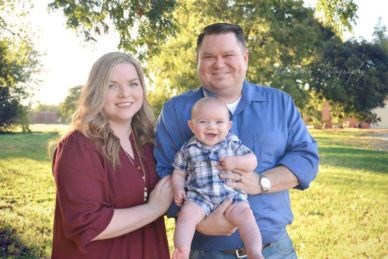IVF and EmbryoScope help Texas couple conceive in Frisco, TX
OVERCOMING OBSTACLES
After three years of trying to conceive, Candace and her husband, Chris, decided to do some research on why they were not getting pregnant. During their research they found CCRM Dallas-Fort Worth (formerly Frisco Institute for Reproductive Medicine), Drs. Marius Meintjes and Rinku Mehta.
“Dr. Mehta was one of the most reviewed out there, with reviews showing she was the best,” says Candace. “I spoke with my husband and said, ‘What if we go and talk with them, what if something is wrong?’” Chris decided to take the first step and made an appointment with his primary care physician, who referred him to a urologist. The urologist ran a few tests and learned that Chris was nearly sterile and was not producing sperm.
After getting Chris’ diagnosis, he and Candace wanted to learn about their options, and set up an appointment with Dr. Mehta. During the meeting they discussed the couple’s concerns and their medical history. Then it was time to test Candace to make sure she was not presenting any additional hurdles to the couple’s attempt to get pregnant.
“I had no idea but quickly learned that I had polycystic ovary syndrome,” recalls Candace. Polycystic ovary syndrome (PCOS) causes an imbalance of some of the reproductive hormones and is one of the leading causes of infertility in women.
“After learning about our obstacles, we were taken aback and had about a two to three week mourning period,” she says. “But then we got back on our feet and came together as a team to be able to have a child.”
Chris returned to the urologist for treatments that would help him start to produce sperm. This treatment was successful and would allow the couple to conceive a child with both Candace’s and Chris’ DNA.
Once they learned they would be able to get some viable sperm from Chris, it was time to return to Dr. Mehta to discuss the options.
“She sat us down and told us that we were going to take the first step, and she had it all lined out,” says Candace. “We started with IUI to see if that would be enough to help us conceive.”
Intrauterine insemination (IUI) inserts a man’s sperm into a woman’s uterus during the time of ovulation to improve the chances of pregnancy.
The couple did two rounds of IUI. When both of those failed, they sat down with Dr. Mehta and discussed the option of in vitro fertilization (IVF). Candace and Chris were scared about the procedures and what the hormones would do to Candace’s health.
This fear was amplified after Chris developed heart failure due to the medicine his urologist prescribed in order to produce sperm. Luckily, they got in with a cardiologist, caught his heart failure early, and was able to reverse it with new experimental medication.
Heart failure was scary enough on its own. And coupled with the prospect of Candace facing more new medications, they were very concerned about going forward. But they learned the chance of heart failure is highly uncommon due to infertility drugs.
Getting Past the Fear
“Dr. Mehta was very hands on, and seemed to be caring about our fears in the whole process,” says Candace. “She gave us a diet plan on how to help us lose weight. She helped us on an emotional level and she was very helpful outlining how each process would go.”
As the couple’s relationship with Dr. Mehta grew, so did their trust in knowing that she could be the one to help them grow their family. The couple moved forward to do IVF with intracytoplasmic sperm injection (ICSI). This procedure directly injected Chris’ sperm into the egg to increase the chance of fertilization.
“Once Dr. Mehta got us to the point where we could at least have children with our own DNA, we realized that we were in good hands and that she was not going to steer us wrong. So, we decided to try what she recommended and see what could happen.”
After a cycle of IVF Candace was pregnant. But eight weeks in, they had another setback; she had a miscarriage. The couple was upset about the loss, and for almost a year stopped trying to get pregnant. But they wanted a baby, and went back to Dr. Mehta, knowing that she gave them the best chance.
Improving their Chances with New Embryo Implantation Technology
For the couples second attempt at IVF. Dr. Meintjes suggested that they use the EmbryoScope to enhance the chance for successful embryo implantation. The EmbryoScope is one of the newest and most advanced technologies in the field of infertility. Embryologists use the EmbryoScope, a high-tech incubator equipped with time-lapse video and a microscope, to monitor embryonic development in real-time.
This enhanced monitoring evaluates the embryo for abnormalities without interrupting the embryo’s growth. EmbryoScope eliminates the need to check on the embryo by removing it from the delicate culture that nourishes it and can be contaminated. This additional step allowed Dr. Meintjes and the embryology team at FIRM to select the embryo with the greatest chance of successful pregnancy to transfer into Candace’s womb.
“When they went in to implant the embryo they had him up on the screen, and you could see it moving and growing right before your eyes,” she recalls. “It ended up being a very special moment to be able to see that and know from day one that I have known something about him.”
Candace and Chris’ baby, Connor, is now nine months old. They couldn’t be more thankful for their research that led them to Drs. Mehta and Meintjes.
“I went in with a lot of fears, and Dr. Mehta really comforted me and let me know that we can do this,” says Candace. “Her optimism, drive and compassion through the whole process really made the entire journey better.”


